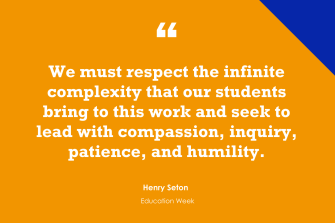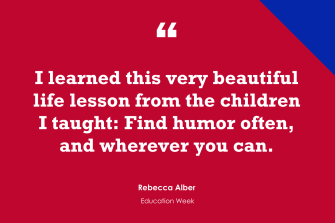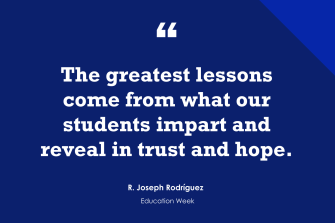(This is the final post in a five-part series. You can see Part One here, Part Two here, Part Three here, and Part Four here.)
The new question-of-the-week is:
What are the most important lessons you have learned from your students?
In Part One, Kyle Lawrence, Irina McGrath, Ph.D., Blanca Huertas, and Denise Fawcett Facey shared their experiences.
In Part Two, Naomi Bailey, Donna L. Shrum, Crystal Watson, and Jenny Edwards, Ph.D., contributed answers.
In Part Three, Aisha Christa Atkinson, M.S., Jen Schwanke, Matthew Johnson, and Andrea Baney offered their reflections.
In Part Four, Cindi Rigsbee, Regie Routman, Ann Stiltner, and Janice Wyatt-Ross responded.
Today, Henry Seton, Rebecca Alber, and R. Joseph Rodríguez wrap up this series.
‘Lead With Questions’
Henry Seton is a humanities teacher leader, writer, and presenter:
A couple days after February vacation, I spotted Melissa trudging toward me through gray parking lot slush with her head down, wavy curls over her eyes. She was a popular scholar-athlete, sought after for group projects and dates at the mall. She had been absent the day before, and I had noticed she often returned from vacations a day or two late, which left her playing catch-up with assignments, unable to achieve straight A’s.
As a veteran teacher, I savored these mornings at the front door. This 20-minute duty, with students trickling in, could be perfect for difficult conversations. My 9th graders typically were only half awake, without their defenses fully up. I could pull struggling students aside for quick one-on-ones and get to the bottom of lingering academic or behavioral issues that I didn’t have time for in class. Quick chats often saw quick results.
And as a veteran, I took pride in being that teacher who embraced challenging conversations rather than avoided them. As we gain experience as teachers, we often develop confidence in our ability to quickly read complex situations that might have confused or scared us as novices. We proudly call out a student for behavior that other colleagues perhaps hesitate to address. We can easily slip into that “hero teacher” mindset, that we are one of the brave few running toward the fire.
I took special pride in seeking out students like Melissa who, I assumed, were escaping the attention of other colleagues. Melissa was never in danger of failing nor overturning the classroom, so she never came up in our grade-level meetings. But I saw her as falling short of her potential and in need of a strong nudge from a veteran like me.
I decided to pull her aside. I jumped right into the trend I had been seeing, the effect it was having on her grades, and why we needed to stop it right away. She listened and sighed in response and kept her head down. After an unconvincing, “Thanks, Mr. Seton,” she continued slouching toward homeroom.
Later that day, I heard from a principal that Melissa had sought him out, upset about our morning interaction. He told me Melissa had been spending the breaks visiting her father in Indiana. Her family could only afford to send her unaccompanied from Boston via Amtrak. The journey could last over 24 hours each way and left her harassed by strangers at night. These oft-delayed treks were why she had been returning late after vacations.
I was able to close the loop with Melissa later that day and apologize, but it was clear that our relationship had experienced a rupture, and our work together that semester never fully recovered.
As our confidence and experience grows as educators, our hunger for action can slip into hastiness. Our certainty that we have seen a situation countless times can lead to dangerous mistakes. Even if our hunch is right 9 times out of 10, our assumptions with the 10th student can irreparably damage our work.
How easily could I have avoided this rupture with Melissa—as well as other similar moments over the years—if I had simply slowed my approach: paused, taken a couple more breaths, and reflected a bit more before intervening. I could have realized that Melissa’s situation—a student consistently coming back late from vacations—was in fact a novel case, one that I had not actually encountered before, one that likely merited more reconnaissance before intervening.
If I had reached out proactively for more information to my school’s leadership and/or social-work teams, I could have spared Melissa our encounter. And even if I decided to seize the moment and jump right into conversation, I could still have assumed best intentions and began with open-ended inquiry rather than scolding. When we lead with questions, students’ answers may only confirm our assumptions, but at least we are giving them an opportunity to be heard and ourselves an opportunity to avoid missteps.
No matter how confident we are in reading a situation, we must respect the infinite complexity that our students bring to this work and seek to lead with compassion, inquiry, patience, and humility.

‘Status Doesn’t Matter’
Rebecca Alber is an instructor at UCLA’s Graduate School of Education. A teacher educator and literacy specialist, she believes education’s true purpose is for liberation and transformation:
When I was a high school English teacher, I learned many, many things from my students. Teaching at a public school located in a part of a city that was hugely underresourced, I witnessed much hardship in the daily lives of students. I also saw many tense and challenging moments and events that would typically make the adults on campus turn serious and stern. But the kids? You could always count on them to find humor in pretty much anything.
When I first started my teaching career, I hadn’t spent much time with teens, so I found this quality very enchanting. If the field trip bus didn’t show or broke down so we had to stay put, the students, though disappointed, would make jokes, and we’d all laugh and get on with our time together. If something harrowing had gone down on campus, or in the neighborhood, or the city, they’d acknowledge it—the seriousness of it—and then still find a way to bring in a little humor. So, as a first-year teacher, I learned this very beautiful life lesson from the children I taught: Find humor often and wherever you can.
Another lesson from the teens? Status doesn’t matter. My first career had been in the private sector and in the very status-driven field of publishing. When I first arrived to my second career, teaching, I immediately saw through the students’ eyes that even if someone carried the title of principal, counselor, police officer, (or even parent!), if that person was not about kindness, care, and connection, then that individual was pretty much persona non grata. They might get perfunctory teen acknowledgement but not much more. This, I thought, is what they mean by keeping it very real. I respected how these young folks intrinsically prioritized treatment over any title or status.
And not directly from the students, but through my work and journey with them, I learned the importance and art of listening on a whole new level. When I would start a class with a firmly set agenda, one I was laser-focused on accomplishing that day, things never went as well as when I would put some of that agenda aside and let them talk and I’d listen. When students are given ample, hearty space to collectively chime in on a topic of interest or concern, and a teacher fully listens and inquires—taking it all in—and then directs the lesson toward their interests and wants, an alchemy occurs that is indescribable. The longer I taught, the more deeply I understood the importance of letting students lead their learning.

We Need to ‘Pause Deliberately and Listen Closely’
R. Joseph Rodríguez teaches at a rural school near Austin, Texas. He is co-editor of English Journal, a publication founded by the National Council of Teachers of English in 1912. Joseph lives in Austin and Fredericksburg, Texas. Catch him via Twitter @escribescribe:
A teacher who notices and pays attention can gain many insights about adolescents’ lives and how they interpret the world around them. To notice requires the teacher to pause deliberately and listen closely through all that is said and unsaid by students who illustrate their worlds with questions and meaning. This was the case for me as I took note of my junior-level students’ perceptions of secondary schooling and also their interactions with classmates and school staff at a rural school near Austin, Texas. During the 2020–21 academic year, I taught English/language arts and reading to 165 students enrolled in my Advanced Placement, on level, and inclusion classes. The number of students and the realities of a pandemic led me to gain significant lessons about their coming of age as adolescents and mine as an educator.
As I teach, I pay attention to the connections and relationships that begin and sustain our dialogue. This practice comes from my reading The Boy Who Would Be a Helicopter: The Uses of Storytelling in the Classroom by Vivian Gussin Paley. Years ago, at a teacher conference, Paley encouraged me to pay greater attention to the living stories of my students and how they interpret who they are in the world. Their experiences and knowledge can inform my understanding far beyond the content I teach and can complement it, too. As a result, I share here some of my students’ thoughts, which became revelatory aphorisms and observations, while others communicated the angst, apprehension, and hope of adolescents who possess acumen, doubt, and wit. (All students’ names are pseudonyms.)
Currently, most of my students work before, during, and after school as we endure the pandemic. Sometimes the harsh reality is that every hour of labor becomes a selfless act for students whose parents once worked in the airline or hospitality industry. For instance, in fall 2020, Carla wrote in her weekly E-Journal Notebook, “My mom takes away my paycheck every week. I wished she wouldn’t. She can ask.” Carla’s honesty was connected to our discussions about child labor, the novel Oliver Twist by Charles Dickens, and the musical play Oliver! Our dialogue took a turn to determine what options young people have to make a living and savings for themselves and their families, pursue their goals, and enjoy adolescence despite economic demands.
What should I tell my students about U.S. democracy after January 6, 2021? I wondered. Instead, the lesson learned was that I permit their perspectives and interpretations to take center stage. For our in-person and remote learning, I invited the dialogue to begin. I heard my students’ words: assault, destruction, infamy, resurrection. “Thanks for letting us talk about what happened yesterday in the capitol/al. Some of our teachers just ignore the topic altogether.”
In retrospect, one of the most telling revelations I heard on February 27, 2020, was when Amory declared, “Mister, school’s gonna get a big shutdown. I play chess online with some kids in China. They’re under a big quarantine. For real! It’s coming. You gotta believe me!” I listened intently and imagined The Great Disruption. Could it be possible? A few students clamored in our third period and added that it would be good reason for us to begin spring break earlier than usual. Who would’ve thought that Amory in rural Texas and his chess teammates in rural China understood the coming pandemic far before we could fathom it? They were already illustrating the coming storm for us.
In the short story “Prologue: The Illustrated Man” by Ray Bradbury, we read about illustrations on the protagonist’s body with the following description: “Each seemed intent upon his own activity; each was a separate gallery portrait.” The lessons of a teaching life are guided by the portraits of coping and enduring we gain from our students’ eyes and working lives. We become witnesses beside them. The greatest lessons come from what our students impart and reveal in trust and hope; we come to understand that we can learn, observe, and witness together.

Thanks to Henry, Rebecca, and Joseph for contributing their thoughts.
Consider contributing a question to be answered in a future post. You can send one to me at lferlazzo@epe.org. When you send it in, let me know if I can use your real name if it’s selected or if you’d prefer remaining anonymous and have a pseudonym in mind.
You can also contact me on Twitter at @Larryferlazzo.
Education Week has published a collection of posts from this blog, along with new material, in an e-book form. It’s titled Classroom Management Q&As: Expert Strategies for Teaching.
Just a reminder; you can subscribe and receive updates from this blog via email (The RSS feed for this blog, and for all Ed Week articles, has been changed by the new redesign—new ones are not yet available). And if you missed any of the highlights from the first 10 years of this blog, you can see a categorized list below.
I am also creating a Twitter list including all contributors to this column.
"like this" - Google News
December 19, 2021 at 11:06PM
https://ift.tt/3J0h97r
Think Like This: Students Have the Best of Intentions (Opinion) - Education Week
"like this" - Google News
https://ift.tt/2MWhj4t
Shoes Man Tutorial
Pos News Update
Meme Update
Korean Entertainment News
Japan News Update
No comments:
Post a Comment